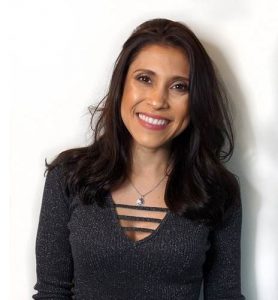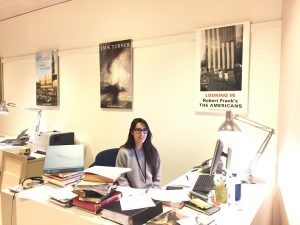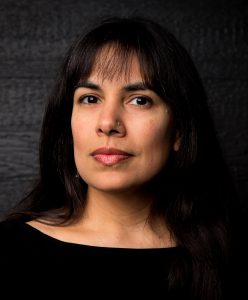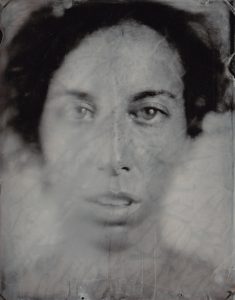CAA News Today
Meet the 2018 Professional Development Fellows
posted by CAA — Jan 28, 2019
CAA has awarded two 2018 Professional Development Fellowships—one in art history and one in visual art—to graduate students in MFA and PhD programs. In addition, CAA has named one honorable mention in art history and two in visual art. The fellows and honorable mentions both receive a complimentary one-year CAA membership and registration for the 2019 Annual Conference in New York City.
The recipient of the $10,000 fellowship in art history is C.C. McKee, a dual PhD candidate in the Department of Art History at Northwestern University and the École des hautes études en sciences sociales in Paris. Accepting the $10,000 fellowship in visual art is Camila Labarca Linaweaver, a MFA candidate in Printmaking at the University of Oklahoma.
The honorable mention for art history goes to Julia Vázquez, a PhD candidate in the Department of Art History & Archaeology at Columbia University. The honorable mentions in visual art are awarded to Kira Dominguez Hultgren, who is earning a MFA/MA in Fine Arts and Visual and Critical Studies at California College of the Arts, and Rowan Renee, who is currently pursuing their MFA at the University of Michigan.
The two fellows and three honorable mentions will be formally recognized at the 107th Annual Conference during Convocation on Wednesday, February 13, 2019.
CAA’s fellowship program supports promising artists and art historians who are enrolled in MFA and PhD programs nationwide. Awards are intended to help them with various aspects of their work, whether for job-search expenses or purchasing materials for the studio. CAA believes a grant of this kind, without contingencies, can best facilitate the transition between graduate studies and professional careers. The program is open to all eligible graduate students in the visual arts and art history. Applications for the 2019 fellowship cycle will open in the late spring.
FELLOW IN ART HISTORY
 C.C. McKee
C.C. McKee
C.C. McKee is a dual doctoral candidate in the Department of Art History at Northwestern University (advised by Huey Copeland) and the École des hautes études en sciences sociales in Paris (advised by Anne Lafont). McKee received his BA from the University of California, Berkeley as a double major with honors in the history of art and highest honors in history.
McKee’s current dissertation project takes up art and visual culture from the francophone Caribbean during the long nineteenth century, arguing that, on the one hand, painting could bolster imperial authority by eliding the coeval inhumane violence and ecological brutality of colonialism. On the other, these artworks are inadvertent repositories for parallel ecologies opening onto embodied African diasporic knowledge of the Caribbean landscape.
This project represents one facet of McKee’s broader investment in the transhistorical relationship between colonialism (particularly during the seventeenth through nineteenth centuries) and its continued effects in the present. These interests include, art of the Atlantic World, contemporary African and African diasporic art, and queer aesthetic practices; all of which are indebted to black feminist, ecocritical, postcolonial, and psychoanalytic theories. McKee has developed these perspectives in various pieces of art criticism; with exhibitions at the Block Museum, Iceberg Projects (Chicago, IL), and the Ghetto Biennale (Port-au-Prince, Haiti); as well as in a forthcoming article for Art Journal. Moving forward, McKee will pursue a scholarly and curatorial practice that challenges the boundaries between the university classroom and the museum, between academic publication and exposing a broad public to the rich artistic traditions of the Caribbean.
FELLOW IN VISUAL ART
 Camila Labarca Linaweaver
Camila Labarca Linaweaver
Camila Labarca Linaweaver was born in Santiago, Chile and immigrated to the United States at the age of 7. She lived and studied in Texas and holds a BFA from The University of Houston Clear Lake. She is a first-generation college graduate and is currently an MFA Printmaking candidate at The University of Oklahoma. While pursuing her graduate studies she has taught undergraduate courses in Printmaking and Drawing. Linaweavers focus within the printmaking medium is almost exclusively on singular and experimental prints. Using the landscape as a metaphor, she crafts narratives of immigrant displacement, loss, and alienation. Recently she has delved into time-based work, subjecting monotypes to various stop motion processes. Her unique approach to confronting her personal history as an immigrant results in highly nuanced imagery that aims to bridge opposing sides and create positive discourse within the context of global immigration issues.
As an emerging artist, Linaweaver has exhibited extensively throughout the US and has chosen to pursue a career in academia. In the future she aspires to participate in residencies and exhibitions that focus on community engagement and the intersection of landscape, identity, and culture.
HONORABLE MENTION IN ART HISTORY
 Julia Vázquez
Julia Vázquez
Julia Vázquez is a PhD candidate in the Department of Art History & Archaeology at Columbia University, where she is currently completing a dissertation titled “The Artist as Curator: Diego Velázquez, 1623-1660.” Her dissertation reconsiders the curatorial career of Diego Velázquez at the court of King Philip IV of Spain. It examines the major redecoration projects that Velázquez executed for galleries in the Spanish royal palace, considering the ways that his ambitions and interests as a painter found a new expression in this medium. It also analyzes significant paintings that Velázquez made in response to the royal art collection, considering the impact on his painting practice not only of its contents, but also of its display. Her research therefore proposes the career of Diego Velázquez at the Hapsburg court as a major episode in the history of the artist-curator, ultimately arguing that Velázquez’s simultaneous creative identities as painter to the king and curator of his art collection were mutually transformative.
Previously, Julia has held internships and fellowships at the Musée du Louvre, the Whitney Museum of American Art, the Meadows Museum, the Museo Nacional del Prado, and the National Gallery of Art. While at the Meadows, she curated two exhibitions: “Picasso’s Dream and Lie of Franco: The Spanish Civil War in Print” (summer 2017) and “Murillo at the Meadows: A 400th-Anniversary Celebration” (2017-2018). She is currently the Hilla Rebay International Fellow at the Solomon R. Guggenheim Museum, the Museo Guggenheim Bilbao, and the Collezione Peggy Guggenheim.
HONORABLE MENTIONS IN VISUAL ART
 Kira Dominguez Hultgren
Kira Dominguez Hultgren
Kira Dominguez Hultgren (b. 1980) is a California-, Utah-, and Minnesota-based textile artist. She studied French postcolonial theory and literature at Princeton University (BA Comparative Literature, 2003), and performance and fine arts in Río Negro, Argentina from 2010-2012. While in Patagonia, she apprenticed with master weaver Mary Coronado, where Dominguez Hultgren studied the process and history of indigenous warp-faced weaving of Mallín Ahogado on a Mapuche vertical post loom.
Today, Dominguez Hultgren combines her interests in postcolonial theory and weaving in both her art and writing-research practice. In her third year at California College of the Arts, Dominguez Hultgren is earning a dual-degree MFA/MA in Fine Arts and Visual and Critical Studies. Her research interests include material and embodied rhetorics, loom technologies, decolonizing material culture, and analyzing textiles as a performative critique against the visual. She has won numerous awards including California College of the Art’s All College Honors Graduate Fine Art Award, the Edwin Anthony and Adalaine Boudreaux Cadogan Scholarship, and the Lenore Tawney Fiber and Material Studies Scholarship. Dominguez Hultgren is represented by Eleanor Harwood Gallery in San Francisco, where she had her first solo show, Wingspan, in 2018.
 Rowan Renee
Rowan Renee
Rowan Renee is a genderqueer artist who uses photography to interrogate how sexual bodies are gendered, victimized, policed and punished. Through photographic, printmaking and sculptural techniques, they produce and appropriate images that intervene on issues of authorship, the representation of queer and feminine bodies within the art-historical canon, and the intersection of homophobia and misogyny in sex law and copyright law. The disjunctures of pleasure and abjection, felt through jouissance, informs their manipulation of images. Through artistic labor, they see a means to construct transformative meaning from experiences of violence, persecution and erasure that threaten queer and feminine subjects.
Currently pursuing their MFA at the University of Michigan, Renee works between Ann Arbor, Michigan and Brooklyn, NY. Their career began in 2006, when they joined The Miss Rockaway Armada, a collaborative flotilla of thirty people who floated down the Mississippi river on junk rafts built from NYC construction waste. Recently, they have received awards from the Aaron Siskind Foundation, the Rema Hort Mann Foundation and the Anchorage Museum of Art, as well as fellowships from the Jerome Foundation and the McColl Center for Visual Art. In 2018 they were named an Elsie Choy Lee Scholar by the University of Michigan. Their solo exhibitions include Z at Pioneer Works (2015), Bodies of Wood at The Aperture Foundation (2017), and No Honor No Heart at the Center for Visual Arts Toledo (2019). Their work has been profiled on NPR, in The New York Times, VICE, Hyperallergic, Huffington Post, American Photo Magazine and Guernica, among many other publications.


